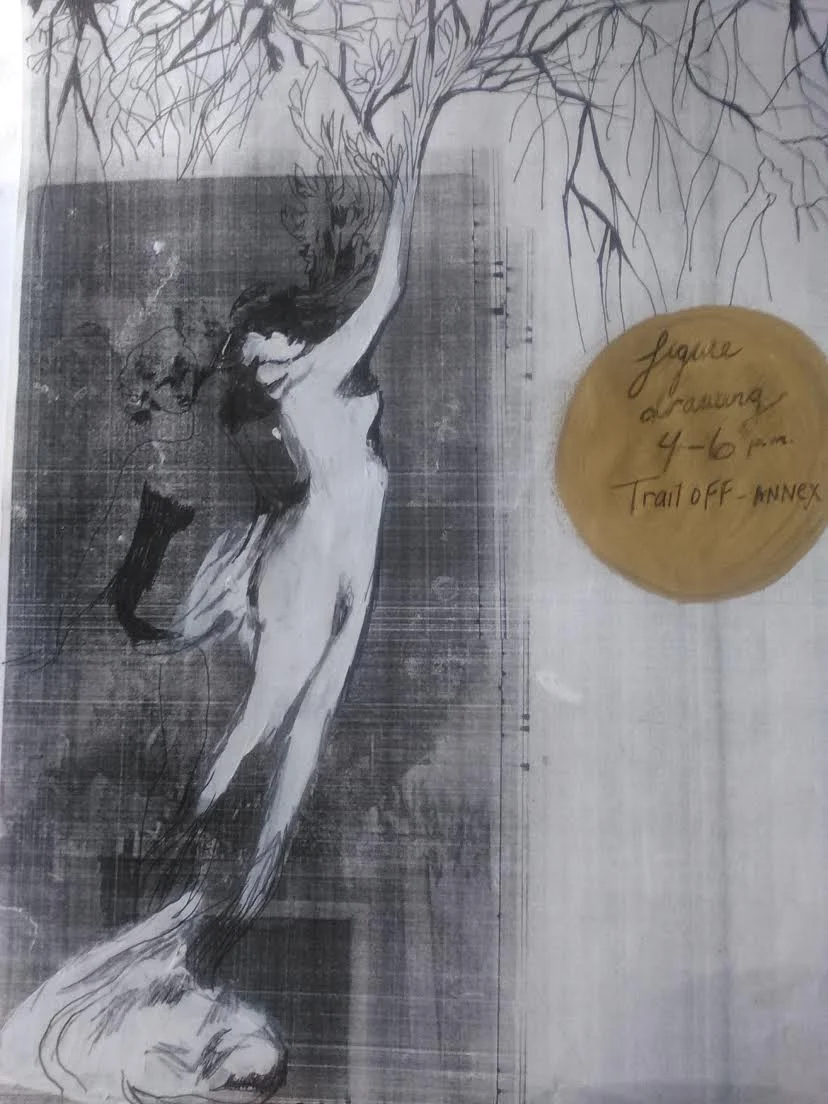Portland, Maine. New Fruit.
Note: SPACE Gallery became somewhat of a throwaway term for established, nonprofit artspaces during our conversation, usually as a comparison point for what New Fruit isn't trying to do. Just to be clear, SPACE does amazing work, including facilitating New Fruit's new grant funding. We all love it.
Portland.
One Aspect: My readiness to hightail it out of Portland's art scene.
Example: Picnic is a the big Portland semi-annual art sale and fair. In summer, fun. In winter, a crowded, enclosed space and live DJ playing at 2pm. I can’t think who's scene that is; it’s definitely not mine.
Counterpoint: The breadth of talent and passion in Portland allows for less successful collaboration and perfection. Trail Off, an installation in the SPACE annex headed by Greg Jaime of so much creative excellence I can’t cover it all here, opened during my last weeks in Portland.
One collaborator for Trail Off, Kelly Rioux, is a co-founder of New Fruit, an alternative artspace in one of my favorite weird grungy parts of the city. Kelly agrees to be part of my interview spree, and we are joined by another co-founder, Gelsey.
New Fruit is housed in what looks like an old warehouse, and there are three to four doors to choose from. I am overwhelmed and flutter around in the snow until Kelly lets me in.
The outdoors probably still exists, but it's irrelevant because New Fruit’s ambience manifests on a practically physical level. The women walk me through the working space, all mysticism and transience, clutter and vacancy. There's a photocopier, printer, darkroom, and the cloistered studios seem incredibly private. I steal peeks into those that have been left open, glimpsing paper, more cloth, a typewriter. There's a perfectly subtle hint of incense, vestiges of large installations dusty on the walls.
Kelly starts the interview while I continue to adjust. I explain my project, my hopes and my uncertainties, because I feel like I can, and they will listen. I slowly regain my head, nestle into my chair and congratulate them on New Fruit's Kindling Fund award.
K We just got it; we even got the contract today. That grant is perfect. As an alternative space, there isn’t a lot you can apply for. You don’t have that organizational status that SPACE has.
NB You started this self-funded?
G Oh yeah. We haven’t even been here for a year. It’s nice to have money.
K It’s scary, too, because once you get funding and keep getting more and more money in then slowly you like evolve into a space like SPACE. You get status and responsibilities that we [do] have, but we work under the radar a lot.
NB You want it to be that way?
G Oh yeah. We want it under the radar so that artists that don’t feel comfortable in professional space feel comfortable here. It’s really important to allow space for people who don’t feel confident about their art and who don’t have any experience. To be like hey, come hang out with us, we don’t know what we’re doing either. Creating space for people to grow in whatever ways and in whatever direction works for them.
K Some of us it’s all of our lives and some of us it’s just something we’re trying to fit in. At the moment [we’re] really interested in having all of it. A lot of people do have jobs and lives and art is something they don’t feel like they can validate. We’re working towards validating that together.
NB Do you feel like you are filling a niche?
K We provide resources and an incubating space for artists. We want to be around each other, that energy is really important to us. As an artist in Portland I haven’t found a space where you interact on a working level without any sort of judgement and with prioritizing women, queer and/or trans. I don’t think that other spaces are necessarily not thinking about that, I just haven’t personally found it. Usually you go to a studio and then there’s another studio and you shut the door and everything’s fine. But here [it’s] a lot more open and communal.
G There hasn’t been a space like this in Portland, [not] for a long time, anyway. I think that spaces like SPACE tend to prioritize people who already have some sort of level up? We wanted a space for folks who don’t feel comfortable with a lot of expectations. We have been doing open studio nights, every Monday. It’s kind of come hang out with us, bring something to work on if you want, or don’t. We have a bunch of random art supplies to use. It’s been our first real consistent opening of our space to the community in terms of using the facilities for art. The darkroom is really exciting, to have something to offer to the community.
K We hear from so many people who are like this is amazing, we feel great here, we can’t rent here but we want to be here. Our hope is one day to have some money come in in other areas so we can make it more accessible. It’s hard navigating how to do that and remain a space that doesn’t use a traditional system.
G Especially because we don’t own this building; we don’t have control over the condition of the space, inviting people into the space puts us at risk.
K I think that’s why a lot of spaces progress or stay under the radar. It’s hard in a city like Portland that is becoming very popular and spaces and buildings are getting sold all the time.
N It’s growing very quickly, especially in the arts.
K I feel really lucky we were able to get this space at the time that we did. I think I would not feel good staying here without this. It’s scary not being able to connect with other artists and not knowing how. A lot of spaces feel intimidating; we hope to bring a less intimidating space. Or maybe intimidating for different kinds of people.
N How focused are you on this idea of a women/queer/trans space?
G If a studio opens up those people have priority over everyone else but we have a lot of bands that are primarily a bunch of guys. We have some pretty tight safer space policies and rules the other spaces definitely don’t have…
K …or haven’t built into their structure…
G Right. If you respect the space and respect the rules here, you’re welcome here. We like to try to open up to those who would have a harder time feeling comfortable in another studio space or asking to have a show somewhere.
K It will always remain women-run. Other [spaces] can be dominated by a lot of males, especially art spaces. Even in spaces with a lot of women the men are always in power. We want to say it doesn’t have to be that way - we can have an equal or more women in [managerial] positions. I think that can feel really intimidating to a lot of people but it really is just one space out of many that can be different.
N Do you work together on the same projects or just have a strong dialogue between members?
G It depends. We’ve done a few installations all together calling it “New Fruit presents,” but we all have our individual work, too. We’re starting to figure out certain aspects of how to put out a collective product. Trying to figure that out has been interesting.
NB Is it hard for either yourselves or other people to let go of the individual ownership?
K I don’t think that comes naturally to us in running spaces. Like Gelsey said we’re still figuring out when a project is New Fruit’s and when it’s your own. I worked on the SPACE project as an artist and Gelsey was a huge part of it, but she was helping me as an artist. There are monthly meetings where decisions and plans can happen and all these different ways to [manage projects] and we love them all. It’s flawed; there’s a lot to work through. We’re figuring it out with the support [we have] here; that’s why the installations keep being really important to us. The opportunity to say, your strengths are here, you can do this, I honor that and respect that. In another situation that might not happen for lots of reasons.
G One thing that’s important to us is having the power come from within all of us, sharing it and giving it to different people at different times. That doesn’t necessarily always happen [with] very clear division of who’s in charge and who does what.
There are a lot of different levels to people, especially the core group that’s been here through the whole thing. Our work does feed off of each others and a lot of influence comes from being around each other in a tight knit group. I was part of two performance pieces last year with New Fruit and it was the first time I’ve ever done that.
K I avoided it in college and after [until I found this] community. Alternative spaces provide the support of people who you really don’t feel judged by. If you have this safety net of people and you fall you just get back up, no one cares. I do think that everyone finds it in different ways, that for some people institutions really do it for them. I don’t want to say that that’s bad, I just know that we provide a different sort of comfort and community.
NB Are you interested in being the only space that offers this?
K We’d like to have a lot of spaces like this. And different - because we don’t fill every need and we’re still working through that. For every space that is just a regular studio I would love for another space to pop up. I think that there are people in the community that will be there for it, they just need it to happen.
By nature and by our values [I think] we will stay relatively under the radar, hopefully work out some of the structural stuff. I think there is a way to do that, being really engaged in your community. As long as we keep working really hard on interacting with people and hearing what they want I think we can manage to float in between. Being a working studio [rather than] just an events space keeps us in that realm.
G The people who started New Fruit remain the same and we have a very similar aesthetic. Things are kind of a mess sometime and we like it like that.
NB I know I feel right at home…
K I think a lot of people do.


